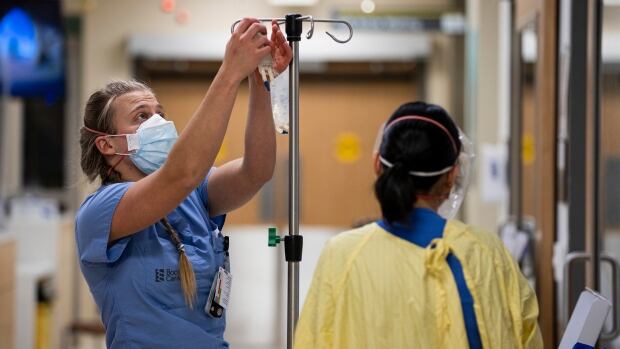
Why mask mandates are lifting in hospitals across Canada
CBC
This is an excerpt from Second Opinion, a weekly analysis of health and medical science news emailed to subscribers. If you haven't subscribed, you can do that by clicking here.
Mask mandates are lifting in hospitals, long-term care homes and other health-care facilities across the country, marking an end to some of the last remaining public health restrictions against COVID-19 in Canada.
British Columbia and Saskatchewan are the latest provinces to lift universal mask mandates in health-care settings, while most other provinces have either previously removed them, left them up to individual hospitals to decide, or will likely soon follow suit.
But what changes for patients and health-care workers may not be clear-cut, as the lifting of mandates doesn't mean an end to masking altogether — and health officials stress that mandates could return to health care in the future, if COVID levels take a turn for the worse.
"Clearly masks are important in health-care settings, we've used them always, and I've been a big supporter of mask wearing when it's appropriate," Dr. Bonnie Henry, B.C. provincial health officer and chair of the council of chief medical officers of health, told CBC News.
"Nobody is telling you not to wear a mask, what we're saying is it's no longer mandatory by a provincial health officer order that everybody do it all the time."
Canadians can expect many areas of hospitals to still encourage masking in emergency rooms and departments with particularly vulnerable patients, like burn units and cancer wards — and health-care workers will still likely wear them in many patient-facing settings.
"If you want to or your provider wants to, masks will certainly be available. So I think it's going to be a gradual transition," Dr. Saqib Shahab, Saskatchewan's chief medical health officer, told CBC Saskatchewan last week.
"We really hope outbreaks won't rise as a result of this policy … but it's something that I think all of us have a role to play in minimizing that risk."
But reaction to the policy change has been mixed, with some health-care worker unions and advocates arguing the move will shift public health responsibilities onto individuals and could even equate to a violation of human rights for high-risk patients.
Part of the reasoning behind the shift in policy is to remove the need for health-care workers, who have faced severe burnout throughout the pandemic, to constantly mask in every area of the hospital — while also still allowing them the freedom to continue to do so.
"We know that most of our staff, when they got infected, weren't getting infected at work, they were getting infected in the community," said Dr. Michael Gardam, an infectious disease specialist and CEO of Health P.E.I.
"And so really the time has kind of come and gone for this and we need to get to a new state where we are masking when we need to — but not routinely, everyday, everywhere."
Dr. Alon Vaisman, an infection control physician at Toronto's University Health Network (UHN) and assistant medical professor at the University of Toronto, said removing universal mask mandates in all health-care settings would likely help to ease health-care worker burnout.

 Run 3 Space | Play Space Running Game
Run 3 Space | Play Space Running Game Traffic Jam 3D | Online Racing Game
Traffic Jam 3D | Online Racing Game Duck Hunt | Play Old Classic Game
Duck Hunt | Play Old Classic Game